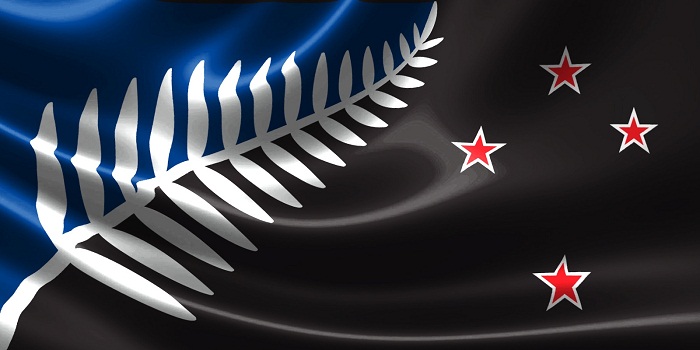New Zealand flag change: final voting begins on historic choice

The second referendum asks voters to choose between it and the current flag. Those correctly enrolled will receive papers in the mail between Thursday 3 March and Friday 11 March.
Voting in the referendum closes on Thursday 24 March with the preliminary result expected around 8.30pm local time. All votes postmarked by Wednesday 23 March will be eligible for the count. .
The final result will be declared on 30 March, after all votes received in time have been processed. If the vote is for change, there could be a transition period of around 12 months.
With only 48% of eligible voters taking part in the first referendum, authorities are hoping for increased engagement in the second.
Professor John Burrows, the chairman of the government-appointed Flag Consideration Panel, said in late January that the vote came down to a question of what flag “best represents [New Zealand’s] shared values and beliefs and how we see ourselves now and into the future”.
“New Zealanders have been talking about the flag for years and it’s time to make a decision,” he said. “It may or may not result in change, but it is unlikely that the decision will be revisited for many years.”
At this stage in the process, the panel sees its role as informative. Its website has a number of resources to help New Zealanders choose between the two designs, including downloadable wallpapers and a video showing a simulation of two flying side by side.
Which would you vote for?
The referendum opens amid apparent flagging support for change, with the One News Colmar Brunton poll in late February finding that two-thirds of New Zealanders are in favour of keeping the current design.
“You can say a lot of bad things about the alternative flag, but probably the worst is that it makes the current flag look good,” wrote commentator Finlay Macdonald.
The Returned and Services Association are also backing the current flag (“we consider it our responsibility, on behalf of all like-minded New Zealanders”), but All Blacks Richie McCaw and Dan Carter have publicly thrown their weight behind Lockwood’s design.
Prime minister John Key, who instigated the flag change debate after his National party was elected to a third term in 2014, has also been explicit about his desire for a new flag.
Earlier in February, a leaked email revealed that the minister for arts, culture and heritage invited a select group of government MPs to meet an organiser for the campaign to change the flag to discuss how to drum up support.
Key rejected suggestions that it was a crisis meeting organised after polling indicated New Zealanders were in favour maintaining the status quo, and said there was no caucus position on the issue.
He told Radio New Zealand on Monday that people who voted to keep the current design would “wake up in a few months’ time and ... realise what a terrible mistake they made”, but denied that he’d consider it a personal loss: “It’s not going to make a blind bit of difference to me,” he said.
The flag change debate – which has never been linked to the question of New Zealand becoming a republic – has followed a somewhat haphazard trajectory since it began in earnest in May last year.
The government was criticised for not appointing a designer or vexillologist to its 12-person panel tasked with selecting a shortlist from nearly 10,300 public submissions.
In the four months to 1 September, when it announced the final four, the group received a total of four hours of design advice – from a Nike shoe designer.
A fifth flag, Aaron Dustin’s Red Peak, was added to the shortlist of four in late September following both a social media campaign and a government bill – but finished third, significantly behind both Lockwood designs.
On 22 January, the preferred alternative flag was flown from the Auckland Harbour Bridge alongside the current flag to help New Zealanders reach a decision in the final referendum.
The new flag flown on the bridge was later confirmed to be the wrong shade of blue, and was replaced at a cost of “less than $4000” ($3666 AU).
The government is estimated to have spent $NZ26m (nearly $A24m) on the two referendums.














































